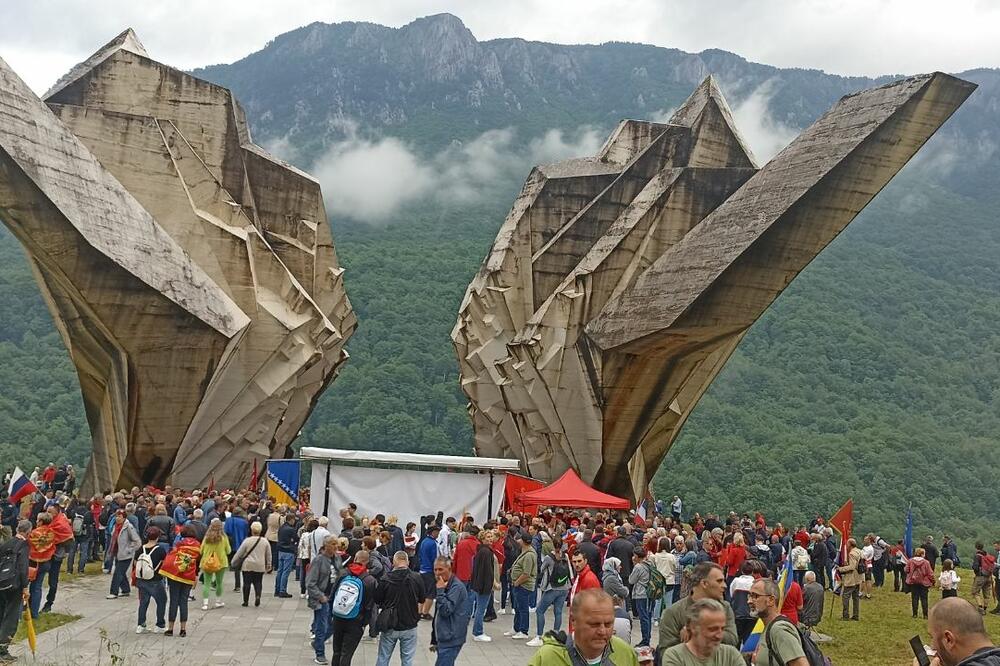It's still roaring... That roar is audible, echoes even after eighty years.
The heroic breakthrough from the hoop in 1943 brought an incredible number of victims. That battle was not really like other battles. The Germans (with helpers) intended to destroy Titov movement. Only such an outcome was - their victory. Any form of survival of the partisan movement - was a stunning victory for Tito and his people's army. That's what happened, with a brutally large number of victims. That death provided the matrix for the future idea of "brotherhood and unity", because the victims were from all over Yugoslavia.
These days it was visible - in the meantime, Sutjeska has become a kind of mirror of all former Yugoslav societies. Everywhere you could read similar questions, but also see resignation due to the attitude of the current authorities towards this jubilee and all that it undeniably represents. There will also be words about cultural "wrong turns".
What kind of mirror is that? And what does a look in the mirror tell us?
Because Sutjeska is the absolute symbolic (and tragic) pinnacle of the Yugoslav idea. And without being aware of that, it's hard to understand how it was possible for everything to happen exactly the way it did.
In Croatia, they emphasize the fact that a huge number of victims were among partisans from Croatia, and the most lucid columnists remind us of the reasons why some events must be viewed without frustration and subsequent "reloading".
In Montenegro, they are mostly surprised - it must be that it is not possible to see Sutjeska from the technical mandate, and in Serbia, the knights from Sutjeska and the occupying servants who killed the best young Serbs, Croats, Montenegrins, Bosniaks have long been legally equalized.
In Bosnia, the problem is of a different kind - you cannot divide Sutjeska into different entities.
However, let's go back a little in the past.
It is true that we once had - and we older people remember it well - the devaluation of jubilee. Communists produced anniversaries as a kind of subsequent writing of history. Of course, I was one of those who were bothered by so many "reminders" of this or that, because, simply at that time, it was a kind of propaganda machine. That could not bother only those who did not mind anything later either, future ideal subjects, that is.
They brought to our school fighters whose stories, told hundreds of times, were already chewed over with sadness, ideological fables... And those fighters too - they weren't exactly the ones from the reading books or from Collection of national heroes (there was also such a book, and it was present in Montenegrin houses as well The Mountain Wreath), but that local, second league... Which did not diminish their enthusiasm, but made their stories uninteresting, without a cure.
When all that, that magnificent energy of struggle - an unparalleled existential test - is freed from ideological restraints and mundane usage, we get the right picture. Not only about those events but also about us today. And yesterday's, of course...
Montenegrin knights from Ljubina's grave, that ancient moment that deserves "reading" even without an ideological framework. The most famous "dispatch" NOB - "while you hear the gunshots"... The gunshots have not been heard for a long time, "there are no living proletarians" for a long time.
Zoran Predin he said nicely, this summer in Đenovići - "You can question everything, and you should, both the party and the communists and all their nonsense... But the partisans are indisputable. I am always for the partisans and with the partisans..."
I also remember the novel for young people "Sutjeska" by partisans and poets Dušan Kostić, was then required reading throughout SFRY. Today, I don't know if it has such a status in Kostić's Montenegro.
As you watch the armchairs being defended around you like Ljuba's grave... look into that "mirror" and you will understand that this is the time of different Montenegrins. And everyone else...
Honestly, it's even hard to imagine Sutjeska where these guys today could win.
Bonus video:





